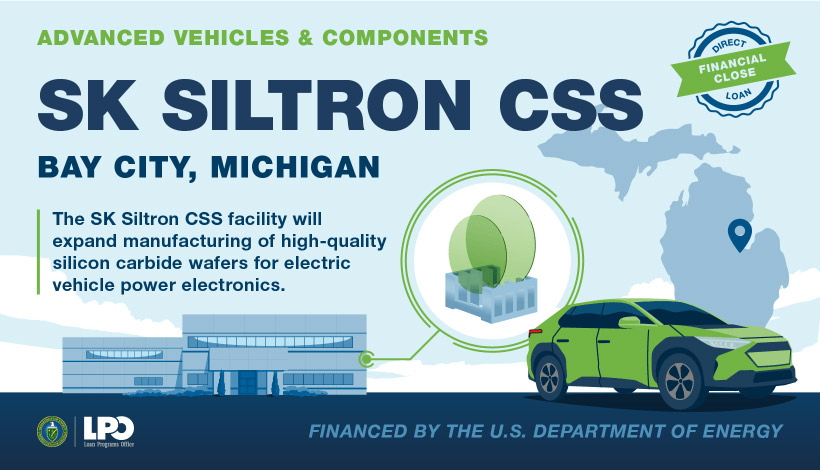News: Suppliers
13 November 2024
SK Siltron CCS gets $481.5m US DOE loan to expand silicon carbide wafer manufacturing
Following the announcement in February of a conditional commitment, as part of the Biden–Harris Administration’s Investing in America agenda the US Department of Energy (DOE) has now confirmed a $544m loan ($481.5m of principal and $62.5m of capitalized interest) to compound semiconductor wafer maker SK Siltron CSS LLC of Auburn, MI, USA (a subsidiary of South Korea-based wafer manufacturer SK Siltron, a part of South Korea’s second-largest conglomerate SK Group) to expand American manufacturing of high-quality silicon carbide (SiC) wafers for electric vehicle (EV) power electronics.
Designed for high-power and high-voltage applications where efficiency and reliability are highly valuable, SiC devices are critical components of EV drivetrains, including inverters, and electrical distribution systems like on-board chargers and DC-to-DC converters. Located at SK Siltron CSS’ facility in Bay City, Michigan, the project is expected to be among the top-five manufacturers of SiC wafers globally, boosting the USA’s manufacturing competitiveness in clean energy technologies.
The project is expected to create up to 200 construction jobs in the build-out phase and up to 200 skilled operations jobs at full production.

Since the beginning of the Biden-Harris Administration, EV sales have more than quadrupled. More than 4.5 million EVs are now on the road in the USA. EVs contain about twice as many semiconductors as internal combustion engine vehicles. The adoption of high-voltage architectures will drive demand for SiC devices globally as the EV market is expected to grow significantly in the years to come. SiC semiconductors allow for higher efficiency and higher voltage, which can mean faster charging times and up to 10% longer range compared with traditional silicon semiconductors. However, maximizing these performance improvements requires semiconductors made from high-quality SiC wafers, for which demand is hence expected to rise with EV sales (which saw unprecedented progress in 2023). The DOE Loan Programs Office (LPO)-supported SK Siltron CCS project will help to address this critical gap, which in turn will create jobs and deliver new economic opportunities to surrounding communities.
SK Siltron CSS sells directly to device makers that make power electronics used across many industries, not just EVs and high-speed EV charging. Market demand is currently being driven by transportation, next-generation cellular (i.e. 5G), artificial intelligence and cloud computing end uses. SiC is also becoming increasingly common in other mid- to high-voltage applications such as solar photovoltaic inverters and DC converters, and industrial chargers and adapters.
The Investing in America agenda supports the onshoring and re-shoring of domestic manufacturing technologies that are critical to meeting the Administration’s goal that half of all new vehicles sold in 2030 are zero-emissions vehicles. The Administration also has a strategy to build a safer, more sustainable transportation system and slash all greenhouse-gas emissions from the transportation sector by 2050. The SK Siltron CCS project is intended to help to achieve these goals by building a more resilient semiconductor supply chain and growing a diverse domestic semiconductor workforce.
As part of the Biden–Harris Administration’s efforts to build an equitable and inclusive clean energy future, LPO borrowers must develop and ultimately implement a comprehensive Community Benefits Plan (CBP) that ensures meaningful community and labor engagement, improves the well-being of residents and workers, and incorporates strong labor standards during construction, operations, and throughout the life of the loan guarantee.
SK Siltron CCS will hence partner with Delta College, less than a mile from the project site, through the Michigan New Jobs Training Program to train local workers for SiC wafer manufacturing. Further, the project site is located near disadvantaged communities, as identified by the Climate and Economic Justice Screening Tool. It is expected to benefit local communities and local workers in line with the Biden–Harris Administration’s Justice40 Initiative, which set a goal that 40% of the overall benefits of certain federal investments flow to disadvantaged communities that are marginalized by underinvestment and overburdened by pollution.
The loan is offered through LPO’s Advanced Technology Vehicles Manufacturing (ATVM) Loan Program, which supports domestic manufacturing of advanced technology vehicles, qualifying components, and materials that improve fuel economy.
SK Siltron CSS secures conditional commitment from US DOE for $544m loan
SK Siltron CSS announces $300m Michigan expansion, adding second facility and up to 150 jobs









